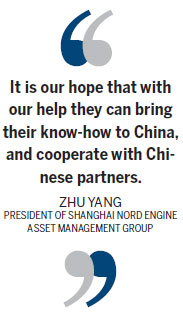Cash injection may mean open sesame for UK firms

| Small and medium-sized businesses are the life-blood of the UK's economy. Zhou Heran / For China Daily |
Firm to lend $250 million, mainly to high-tech firms looking to expand into China
It is something countless British technology startups face: in a tightened economy, despite insisting they expect their revenue to grow quickly, the chances of getting sufficient funding are slim.
The Daily Telegraph in London reported last year that as many fledging firms continue to struggle, more than half of Britain's SMEs had resorted to using credit cards for working capital.
The same percentage used bank debt to finance growth, while just 3 percent of UK entrepreneurs had managed to obtain equity finance.
It has been like this for years, in fact, ever since the burst of the dotcom bubble left a yawning funding gap that many simply fell into.
However, one Chinese company now hopes that this gap in the market can be lucrative.
Shanghai Nord Engine Asset Management Group, a little-known financial services firm, says it plans to inject 150 million pounds ($250 million; 184 million euros) directly into the British SME market, and open its first overseas operation in the country in September.
Zhu Yang, its president, says he defines SMEs in Britain as companies whose turnover is below 20 million pounds.
"If we invest 3 million pounds in each, we can invest in dozens," he says confidently.
Zhu claims his firm is the first Chinese institution focusing on the British SME market.

He and his team plan to target technology sector companies, particularly those with strong commercial, research and development capabilities, and they will then work to help them access the Chinese market.
"But companies must prove to us they have potential and must have a strong will to grow their business with China."
The Confederation of British Industry, the UK's leading business lobbying organization, says SMEs play a crucial role in driving growth, opening new markets and creating jobs.
They account for 99.9 percent of British private companies and provide 60 percent of the private sector workforce.
But many experts, including Yao Shujie, head of the School of Contemporary Chinese Studies at the University of Nottingham, think more should be done to encourage overseas investment and support for such a vital segment of the economy.
"Investing in an SME rather than a larger company can create more jobs and help to foster new industries," he says.
But he also admits that SME investment still carries huge risks, as start-ups traditionally struggle most in their earlier years.
Zhu Yang's plans were first announced during Chinese Premier Li Keqiang's visit to Britain last month.
"We are not going to buy them," Zhu says. "Instead we can provide them with value and the skills they need to break into China.
"We will inject capital and provide them with help, and we are looking to support them for years.
"The reason we are targeting SMEs is that big enterprises are not as stretched for capital as smaller ones; they also have narrower scope to grow."
The lure of British technology, he says, remains strong overseas but he recognizes it is a sector that has traditionally found it hard to raise funds.
"It is the smaller laboratories and technology companies who may change our society in future," he adds.
Zhu says he is in talks with an environmental protection company whose main activity involves turning waste into renewable energy.
He points to companies in Oxford and Cambridge and other educational centers in the UK as delivering the kind of cutting-edge technology that he and his team can help to develop.
Given the Chinese government's priority of cleaning up its environment, he says that British green energy and sustainable development startups and SMEs are firmly in his sights.
"A lot of the technology being developed is right on the edge of being commercialized, but taking that next step can be difficult for many, given the lack of funding available.
"It is our hope that with our help they can bring their know-how to China, and work with Chinese partners.
"I am sure that once they are settled in China, they will be given the opportunity to grow rapidly"
Zhu says those SMEs were first introduced to Shanghai Nord by UK Trade & Investment, a government department that encourages and supports international links for British companies.
To start with, Zhu says individual investments are likely to be between 1 million pounds and 4 million pounds.
"We will then plan to work with them for up to eight years."
Founded in 2008, Shanghai Nord's activities include hedge fund and equity investments, investment banking, fixed income deals, and overseas investment in commodity and real estate funds, made through various subsidiary companies and divisions. It has about 100 staff.
Zhu says his plans have been warmly welcomed by the British government, which he says favours foreign investors willing to inject money into SMEs.
But he adds: "European countries also face an urgent need to develop their SMEs. In fact, across the continent there are very few cases of SMEs successfully entering the Chinese market."
As China's growing middle class continues to consume more, Zhu says, he hopes to see more quality goods and services coming from the UK, and in turn, the companies he helps will "boost industrial levels in China".
Shanghai Nord has a rich mix of expertise and funds available from a range of industries, he says, "and that's a great advantage to have", adding he will also look at opportunities in sectors, such as food and services, if they arise.
"It might be a case of bringing two or three companies together, if that works, providing them with resources and help."
Like many Chinese companies, Shanghai Nord ultimately aims to expand in various countries, but at the moment Zhu is focused on the UK.
"If we can help 30 to 50 enterprises successfully enter China, our British investment model could then be replicated around the world."
Zhou Heran contributed to this story.
zhangchunyan@chinadaily.com.cn
(China Daily European Weekly 07/18/2014 page20)
Today's Top News
- New engine powers cargo drone expansion
- China to boost intl cooperation on green tech
- Factory activity sees marginal improvement in November
- Venezuela slams US' 'colonial threat' on its airspace
- Xi: Strengthen cyberspace governance framework
- Takaichi must stop rubbing salt in wounds, retract Taiwan remarks































